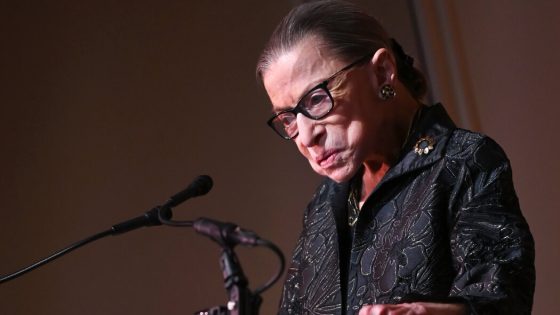When Justice Ruth Bader Ginsburg, a champion of liberal causes whose advocacy of women’s rights catapulted her to pop culture fame, helped establish a leadership award in 2019, she said she intended to celebrate “women who exemplify human qualities of empathy and humility.”
But this year, four of the recipients are men, including Elon Musk, the tech entrepreneur who frequently lobs tirades at perceived critics; Rupert Murdoch, the business magnate whose empire gave rise to conservative media; and Michael Milken, the face of corporate greed in the 1980s who served nearly two years in prison. It has prompted family members and close colleagues of Justice Ginsburg to demand that her name be removed from the honor, commonly called the R.B.G. Award.
In a statement, her daughter, Jane C. Ginsburg, a law professor at Columbia University, said the choice of winners this year was “an affront to the memory of our mother.”
“The justice’s family wish to make clear that they do not support using their mother’s name to celebrate this year’s slate of awardees, and that the justice’s family has no affiliation with and does not endorse these awards,” Ms. Ginsburg said.
Even as he declined to specify any of the recipients who he believed undermined the spirit of the award, Trevor W. Morrison, a former dean of New York University School of Law and one of the justice’s former law clerks, expressed concern that not all of them reflected the justice’s values.
“Justice Ginsburg had an abiding commitment to careful, rigorous analysis and to fair-minded engagement with people of opposing views,” he said in a letter addressed to the organization that confers the awards, the Dwight D. Opperman Foundation. “It is difficult to see how the decision to bestow the R.B.G. Award on this year’s slate reflects any appreciation for — or even awareness of — these dimensions of the justice’s legacy.”
The recipients, who also include the businesswoman Martha Stewart and the actor Sylvester Stallone, will receive the Justice Ruth Bader Ginsburg Leadership Award in April at the Library of Congress, where there is typically a ceremony and gala.
The Opperman Foundation declined to comment on the pushback. But in announcing its decision to recognize both men and women — until this year, the honor was called the Justice Ruth Bader Ginsburg Woman of Leadership Award — it said it sought to uphold the value of gender equality.
“Justice Ginsburg fought not only for women but for everyone,” Julie Opperman, the chairwoman of the foundation, said in a statement. “Going forward, to embrace the fullness of Justice Ginsburg’s legacy, we honor both women and men who have changed the world by doing what they do best.”
Still, this year’s winners stand in stark contrast to past recipients, who include Queen Elizabeth II, the fashion designer Diane von Furstenberg and the actress and singer Barbra Streisand.
Some critics said a few of the honorees were antithetical to what the justice stood for.
“A self-described ‘flaming feminist litigator,’ Justice Ginsburg represented both men and women who defied gender norms and stereotypes as a way of advancing gender equality,” said Shana Knizhnik, an author of “Notorious RBG: The Life and Times of Ruth Bader Ginsburg.” “Honoring Elon Musk, who uses his platform to promote anti-feminist and anti-L.G.B.T.Q. sentiments, and Rupert Murdoch, who has used his immense power to undermine democracy, dishonors what Justice Ginsburg spent her career standing for.”
Mr. Musk and Mr. Murdoch did not respond to multiple requests for comment.
The justice cut a distinctive path from the start.
When she entered Harvard Law School in 1956, she was one of the nine women in a class of over 500. In her first year, she balanced the intensity of law school with raising a child and caring for her husband, who had been recently diagnosed with cancer. She remained at the top of the class.
Nevertheless, she was still chastised for taking a man’s spot in the class.
Over the nearly three decades she spent on the court, she emerged as a progressive voice, on the winning side in cases involving abortion, affirmative action and gender equality. Even when she found herself in the minority, she did some of her most notable work in dissent.
Reflecting on the awards, Justice Ginsburg’s son pointed to the timing of the announcement.
“Today would have been Mom’s 91st birthday,” said James S. Ginsburg, the founder of Cedille Records, a classical music recording company. “So it would be a perfect day to correct the record on this insult to her name and legacy.”
Source Agencies




